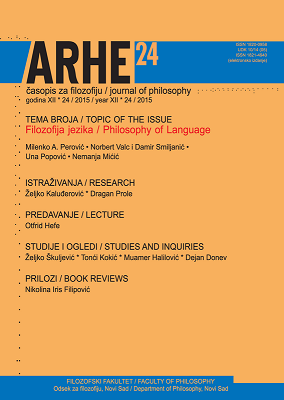Teorijski temelji stoičke prakse: teorija prirodnog zakona
Theoretical Foundations of Stoic Ethics: Natural Law Theory
Author(s): Tonći KokićSubject(s): Metaphysics, Epistemology, Logic, Ethics / Practical Philosophy, Ancient Philosphy
Published by: Филозофски факултет, Универзитет у Новом Саду
Keywords: ethics; physics; Hellenistic philosophy; logic; natural law theory;
Summary/Abstract: Stoicism is the most important and influential philosophical doctrine of the Hellenistic period, and its ethical aspect, implying the totality of stoic philosophy, represents ‘fruit of a garden’. Theoretical foundations and fi rst postulates of Stoic ethics are the most clear and systematic ethical doctrine of ancient philosophy. Review and understanding of their ethics assumes acceptance of wholeness of stoic philosophical thought and inseparability of its aspects: logic (logikḗ, lógos) that studies the content matter and physics (phýsis, nature, God, pneûma, cosmic lógos) that is the true nature. Totality of Stoic teaching and inseparability of ethics arises for the idea of the perfection of nature formed by lógos, which is the reference point for everything including the moral action. Ethical values can be known only through logical analysis of compliance of nature of certain beings with Nature. For this reason, the author presents overview of the mentioned aspects of stoic philosophical thought and its ethical resultant. Finally, it seems unquestionable that the Stoic ethics in Western Philosophy is the first comprehensive and systematic display of the eternal moral law built in the structure of Nature, which can be comprehended by the reason of the morally free agent – a human person. According to this, the theoretical foundation of the Stoic practice is in the ethical natural law theory.
Journal: Arhe
- Issue Year: 2015
- Issue No: 24
- Page Range: 147-162
- Page Count: 16
- Language: Croatian

